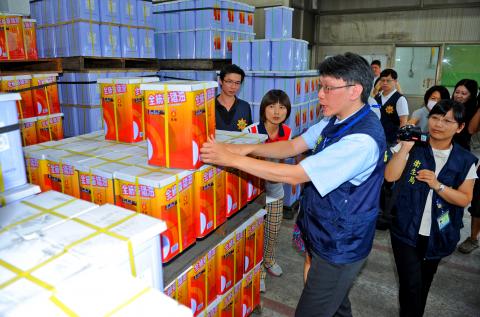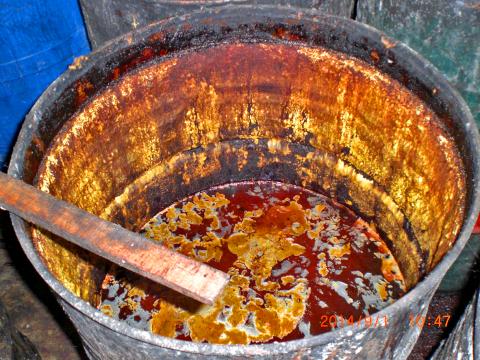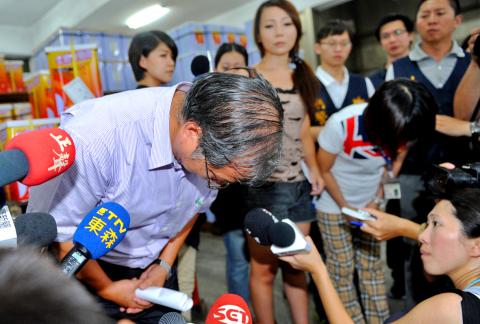Chang Guann Co (強冠企業), a food oil manufacturer in Greater Kaohsiung, yesterday apologized to the public after one of its lard products was allegedly found to be tainted with “gutter oil” illegally recycled by an unlicensed factory in Pingtung County.
Gutter oil, also known as drainage oil, is recycled oil collected from various sources such as kitchen fryers, restaurant drains and grease traps. It is mainly used in the production of soap.
“We only began purchasing lard from the Pingtung factory on Feb. 25 this year. As of last month, a total of 243 tonnes of lard had been bought from the factory, 216 tonnes of which have been used as a base oil in the manufacturing of 780 tonnes of edible lard oil,” the company based in Daliao District (大寮) said in a press release.

Photo: Chang Chung-yi, Taipei Times
There was an immediate trickle-down effect after Chang Guann Co’s apology. Wei Chuan Foods Corp (味全食品工業) said it had immediately pulled 12 pork floss and meat paste products from stores.
Wei Chuan has purchased oil products that have been found to have questionable ingredients from Chang Guann Co and used them in the 12 products, so it decided to temporarily stop sales for the products and accept returns from consumers, Wei Chuan said in a statement to the Taiwan Stock Exchange.
The company said it had informed Taipei’s Public Health Bureau and would fully cooperate with the government regarding inspection on these products.

Photo: Huang Chien-hua, Taipei Times
Wei Chuan said it will consider seeking reimbursement from Chang Guann to protect its rights and interests if the oil products purchased from Chang Guann are confirmed to have included the suspect ingredients.
Chang Guann said the 780 tonnes of processed lard oil were divided into 51,700 cartons and marketed as “fragrant lard oil” (香豬油) under its cooking oil brand, Chuan Tung (全統), and that 48,500 cartons had been sold.
“We are also a victim in this case. Although not all of our fragrant lard oil products contain the alleged gutter oil, to safeguard consumers’ interest, on Tuesday we ordered the recall of all products with an expiration date before March 1 next year,” the company said.

Photo: Chang Chung-yi, Taipei Times
The statement was issued just hours after Chang Guann deputy general manager Tai Chi-chuan (戴啟川) was summoned for questioning by the Pingtung District Prosecutors’ Office, following a raid carried out by the Criminal Investigation Bureau’s southern crime combat center on the unlicensed factory in Pingtung.
The factory’s owner, Kuo Lieh-cheng, (郭烈成) and an employee surnamed Shih (施) were also questioned yesterday, along with Kuo Chun-yeh (郭春葉), the owner of animal feed manufacturer Ching Wei Co (進威) — which allegedly bought gutter oil from the same factory for use in its pig feed products — Kuo’s wife and an employee surnamed Su (蘇), Pingtung Chief District Prosecutor Yang Wan-li (楊婉莉) said.
“The office joined hands with the Food and Drug Administration [FDA] and the health departments of Pingtung and Greater Kaohsiung to investigate whether the factory sold gutter oil disguised as lard, and where and to whom such products were sold,” Yang said.
FDA Southern Center Deputy Director Liu Fang-ming (劉芳銘) said a preliminary investigation showed that Chang Guann’s fragrant lard oil products manufactured between March 1 and Aug. 29 could have been mixed with the alleged gutter oil.
“Since the potentially contaminated products were packaged in 15kg and 16kg cartons, they were likely to have been sold to small restaurants or eateries rather than consumers,” Liu said.
If Chang Guann bought the suspect lard without knowing what it really was, the company’s owners might only be subject to a fine ranging from NT$60,000 (US$2,000) to NT$50 million, as stipulated in Article 15 of the Act Governing Food Safety and Sanitation (食品安全衛生管理法), Liu said.
“However, if the firm was aware of the lard’s real contents and still used it to manufacture cooking oil, its owners could face a maximum prison term of seven years,” he said.
Additional reporting by Amy Su

MAKING WAVES: China’s maritime militia could become a nontraditional threat in war, clogging up shipping lanes to prevent US or Japanese intervention, a report said About 1,900 Chinese ships flying flags of convenience and fishing vessels that participated in China’s military exercises around Taiwan last month and in January have been listed for monitoring, Coast Guard Administration (CGA) Deputy Director-General Hsieh Ching-chin (謝慶欽) said yesterday. Following amendments to the Commercial Port Act (商港法) and the Law of Ships (船舶法) last month, the CGA can designate possible berthing areas or deny ports of call for vessels suspected of loitering around areas where undersea cables can be accessed, Oceans Affairs Council Minister Kuan Bi-ling (管碧玲) said. The list of suspected ships, originally 300, had risen to about 1,900 as

Japan’s strategic alliance with the US would collapse if Tokyo were to turn away from a conflict in Taiwan, Japanese Prime Minister Sanae Takaichi said yesterday, but distanced herself from previous comments that suggested a possible military response in such an event. Takaichi expressed her latest views on a nationally broadcast TV program late on Monday, where an opposition party leader criticized her for igniting tensions with China with the earlier remarks. Ties between Japan and China have sunk to the worst level in years after Takaichi said in November that a hypothetical Chinese attack on Taiwan could bring about a Japanese

MORE RESPONSIBILITY: Draftees would be expected to fight alongside professional soldiers, likely requiring the transformation of some training brigades into combat units The armed forces are to start incorporating new conscripts into combined arms brigades this year to enhance combat readiness, the Executive Yuan’s latest policy report said. The new policy would affect Taiwanese men entering the military for their compulsory service, which was extended to one year under reforms by then-president Tsai Ing-wen (蔡英文) in 2022. The conscripts would be trained to operate machine guns, uncrewed aerial vehicles, anti-tank guided missile launchers and Stinger air defense systems, the report said, adding that the basic training would be lengthened to eight weeks. After basic training, conscripts would be sorted into infantry battalions that would take

DEEP-STRIKE CAPABILITY: The scenario simulated a PLA drill that turned into an assault on Taiwan’s critical infrastructure, with the launchers providing fire support Taiwan yesterday conducted this year’s first military exercises at Longsiang Base in Taichung, demonstrating the newly acquired High Mobility Artillery Rocket System’s (HIMARS) ability to provide fire support and deep-strike capabilities. The scenario simulated an attack on Penghu County, with HIMARS trucks immediately rolling into designated launch areas and firing barrages at the Wangan (望安) and Cimei (七美) islands, simulating the provision of fire support against invading forces. The HIMARS are supposed to “fire and leave,” which would significantly increase personnel and equipment survivability, a military official said. The drill simulated an exercise launched by the Chinese People’s Liberation Army (PLA) Eastern